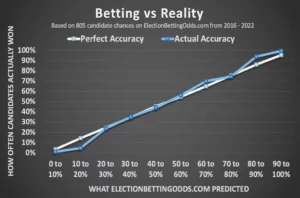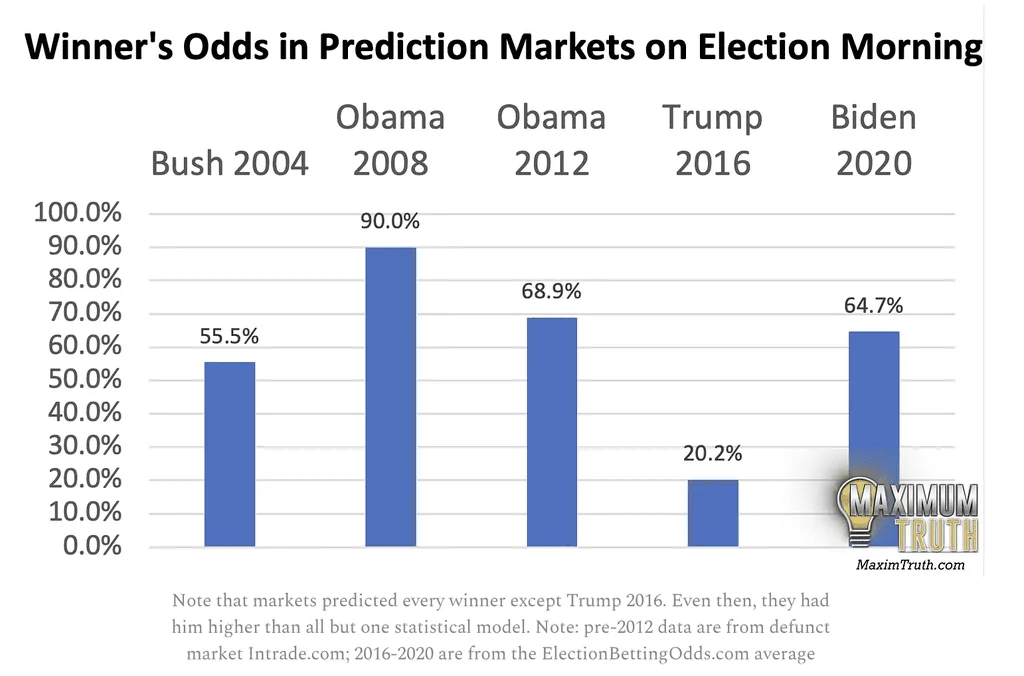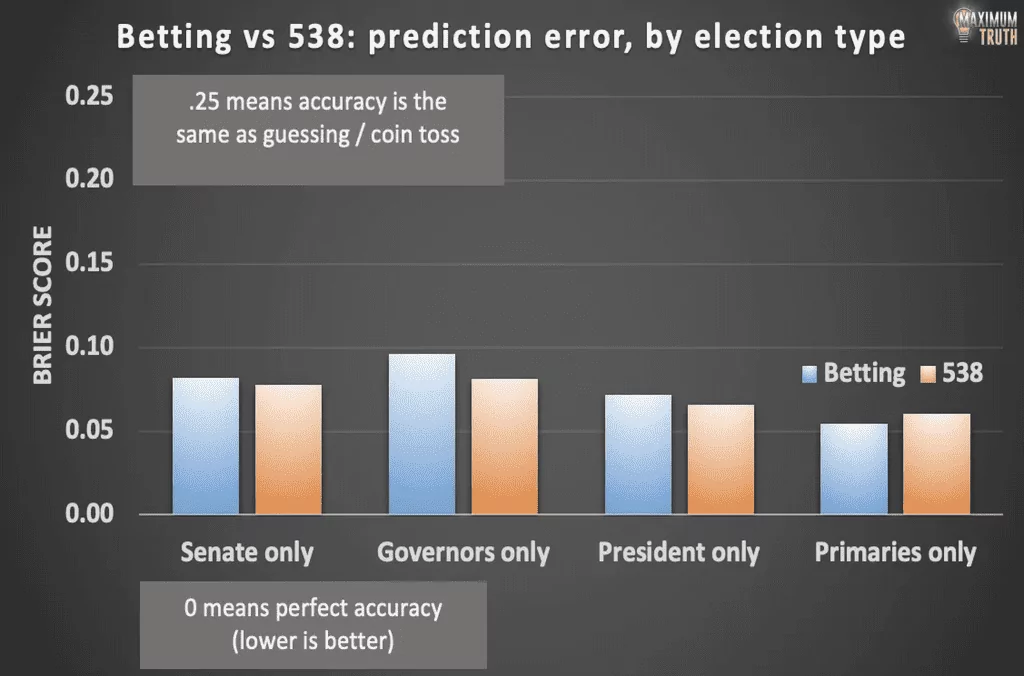
Well over $500 million were bet on the 2020 election, and that number has surged in 2024. Just under two weeks out, more than $2.3 billion have been bet on the 2024 presidential election on Polymarket alone. This raises the question: What is election betting, and do betting odds reflect actual probability?
Maxim Lott, founder of ElectionBettingOdds.com, explained to the Washington Examiner why betting odds are more predictive than the polls and revealed the “turning point” that jump-started former President Donald Trump’s rise in the election odds and polling.
“The betting odds are more reliable because people have to put their money where their mouths are,” Lott said. “That makes most people think twice, and to be more careful, before they weigh in about who will actually win.”
2024 ELECTIONS LIVE UPDATES: LATEST NEWS ON THE TRUMP-HARRIS PRESIDENTIAL RACE
Predicting the future: How hard is it?
Having tracked hundreds of races since 2015, Lott affirmed “the betting odds have a great track record.” He explained that “specifically, candidates who were given a certain percent chance of winning actually won approximately that percentage of the time. For example, the graph below shows that candidates who were given a 70-80% chance actually won about 75% of the time.”

Between 2016 and 2022, ElectionBettingOdds tracked 807 different candidates’ chances across a number of elections. They found that if bettors gave a candidate between a 90% and 100% chance to win, that candidate won 99.4% of the time. Candidates given between an 80% and 90% chance won 93.8% of the time.
Between 70% and 80%, that drops to 74.4%. Between 60% and 70%, it’s 68.8%. Between 50% and 60%, it’s 56%. Between 40% and 50%, it’s 44%. Between 30% and 40%, it’s 34.9%. Between 20% and 30%, it’s 23.8%. Between 10% and 20%, it’s 4.5%, and between 0% and 10%, it’s 1%.
According to the data, the betting odds are extremely efficient at predicting the correct probability that a candidate will win. There is, however, an “underdog bias” present in races where one candidate is heavily favored over the other. This bias produces a higher predicted chance of upset in some races that are more or less decided before Election Day.
Lott’s research has also found that election betting odds have a slight lean toward Democratic candidates but less so than FiveThirtyEight’s model does. Both tend to be more “surprised” when a Republican wins.
In total, 88.9% of candidates favored in the election betting odds won out of the 807 tracked. Only three betting underdogs have won the presidential election since the 1940s, and two were only slight underdogs. JFK won at +110, Carter won at +100, but Trump won in 2016 despite +375 odds.

Why bettors get it right and likely voters get it wrong
In 2020, the polling data found that most likely voters thought Trump would win the election until the very beginning of October, at which point they slightly favored President Joe Biden. Yet, Biden led in the polls by nearly 10 percentage points from July to Election Day. The bettors, on the other hand, were with Biden the whole time — and with a relatively high degree of certainty.
The likely voters asked in polls who they believe will win the election, regardless of preference, have nothing to lose for being wrong. Bettors, contrarily, “have to put their money where their mouths are.”
Lott said: “Likely voters who are surveyed on the phone are just giving their gut impressions, which could be based on anything. Bettors have their gut impressions too, but are additionally looking at polling, trends, statistical models, early vote data, and news events which might make a difference — like a candidate blunder or an escalation in the war in the Middle East.”
Bettors do get it wrong sometimes, most notably in 2016 when Trump shocked the world and defeated Hillary Clinton. Lott explained: “While the bettors got it wrong, every other forecaster also got it wrong, and usually by much more.”
“The bettors gave Trump a 20% chance on election morning, while the New York Times gave him 15%, the Daily Kos gave him 8%, the Huffington Post gave him just 2%, and Princeton Election Consortium gave him less than 1%,” he said. “Partly from those embarrassments, all of those forecasters have since given up trying to statistically predict elections in advance.”
He explained that bettors “failed to predict his win” despite being “more attuned” to his chances than most experts because “Trump was way down in the polls, and Trump running for president was uncharted territory. This time around, they are certainly not discounting his chances.”
“After 2016,” Lott said, “bettors certainly became more open to the idea that outsiders, nonpoliticians, and populists might win major elections.”
Statistically speaking, “the underdog should win some of the time,” Lott added. “If the bettors give a 20% chance of winning in 5 different elections, it means that out of those five, the underdog should win one.”
‘A turning point’: Public appearances shift the paradigm
Public appearances have coincided with many of the biggest election betting odds shifts this election cycle. Biden’s campaign was essentially deemed a lost cause by bettors after his June debate performance, which prompted his ouster from the Democratic ticket. In fact, bettors gave Vice President Kamala Harris a higher probability of winning before she was even promoted.
When asked if the election betting markets react too harshly following notable public appearances, Lott said, “I think they are just as reactive as they should be” and pointed to three major “public appearance shifts” that he has followed.
The first shift came after the June 27 Biden-Trump debate: “Biden’s odds plunged from 36% to 24% that evening, an enormous drop,” he said. “I felt it must be too big. The bettors were right.”
The second shift came after the Sept. 10 Trump-Harris debate: “Harris rose about 5 points that night, from 47% to 52%,” Lott said. “Bettors’ predicted shift was reflected in a polling shift towards Harris over the following couple of weeks, so I’d say that proved them right.”
The third shift came after the Oct. 1 vice presidential debate, which he says bettors actually underreacted. “Bettors gave the edge to Vance, and over the next day, raised Trump’s odds of winning by about 1 point,” he said. “They may have underestimated the impact of the debate, as it marked a turning point at which Trump started gaining in the polls and odds (a trend that has continued up through today.)”
The Washington Examiner has reported on how other appearances have affected the odds following the vice presidential debate, including when Harris’s odds fell by 3.1 points after her 60 Minutes interview was released on Oct. 7 and when her odds dropped another 2.6 points following her Oct. 16 Fox News interview. Both performances drew criticism from Republicans and Democrats alike.
Still time for an ‘October surprise’
As things stand, the 2024 election betting odds paint an optimistic picture for Republicans if they are proven right. Bettors give Trump a 60% chance to win the presidency, they give Republicans a 51% chance at a House majority, and they give the GOP an 84% chance at a Senate majority.
“If the candidates continue to campaign as they are now, I (and the markets) expect Trump to be favored going into Election Day,” Lott predicted.
But he said that “there is still time for an ‘October surprise’ or something shocking to happen.”
If there is going to be an October surprise, it will likely come after a notable public appearance or major world event. Both Trump and Harris have a number of appearances on the docket over the next two weeks, while Israel is gearing up for a “lethal” retaliatory strike on Iran for its Oct. 1 missile attack.
Republicans are now predicted to have a 52-48 Senate majority by the betting odds — however, three races where GOP underdogs have a realistic shot include Wisconsin, Michigan, and Pennsylvania. All three Democratic favorites have seen their odds drop over the last week as the races have tightened.
Bettors are giving Republican Dave McCormick a 30.8% chance to upset Sen. Bob Casey (D-PA), Republican Mike Rogers a 31.8% chance to beat Rep. Elissa Slotkin (D-MI), and Republican Eric Hovde a 32.1% chance of ousting Sen. Tammy Baldwin (D-WI).
“Republicans certainly have a chance of flipping those,” Lott said. “If the election were held today, then on average, those odds suggest they’d win one of those three.”
He also shared that betting odds for House and Senate races are “nearly as predictive” as presidential election betting odds. “There has not been a major difference,” he said. He noted, though, that “bettors have been slightly worse at predicting governors’ races” than any other.

‘Whale’ watch: Do splash bets shift odds?
Reports of “whale” bettors have surfaced in the final stretch of election season, notably $43 million was wagered across four Polymarket accounts on Trump and other scenarios featuring Republican victory. According to Blockchain analyst Miguel Morel, these four accounts may be the “same entity.”
Other sizable bets have also been made recently, including a $500,000 bet on Harris to win the election last week on the first fully legal widespread election betting platform in the United States, Kalshi.
BREAKING: Over $500,000 was just placed on Kamala Harris to WIN the Presidential Election pic.twitter.com/g5gkoA24AP
— Kalshi (@Kalshi) October 18, 2024
On whether these large bets can affect the election odds, Lott admitted they “may have played some role in bringing up Trump’s odds in general.” However, he also said the former president “has also gained in the odds, regardless of the big ‘whale’ traders.”
CLICK HERE TO READ MORE FROM THE WASHINGTON EXAMINER
He pointed to U.S.-based exchange PredictIt, which only allows users to bet up to $850 on each candidate: “As a result, there are no ‘whales’ there, and little ability for anyone to do ‘arbitrage’ and bring it in line with other markets. Yet PredictIt has still shifted to Trump and currently gives him between a 53% and 54% chance of winning.”
“So we know that bettors favor Trump, whales or no whales,” Lott said.







